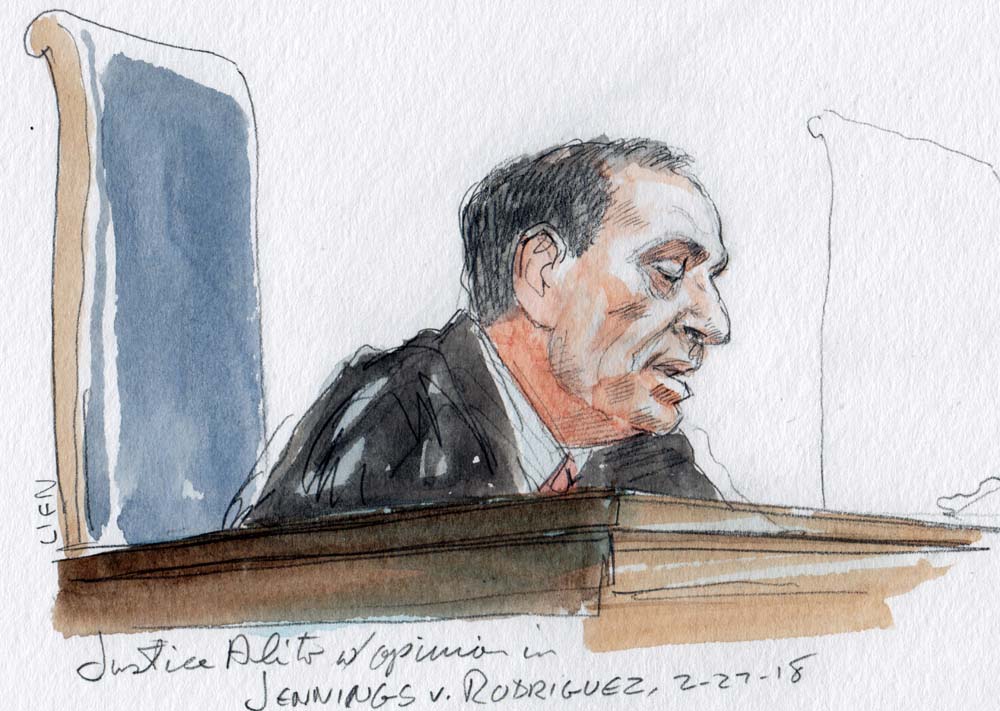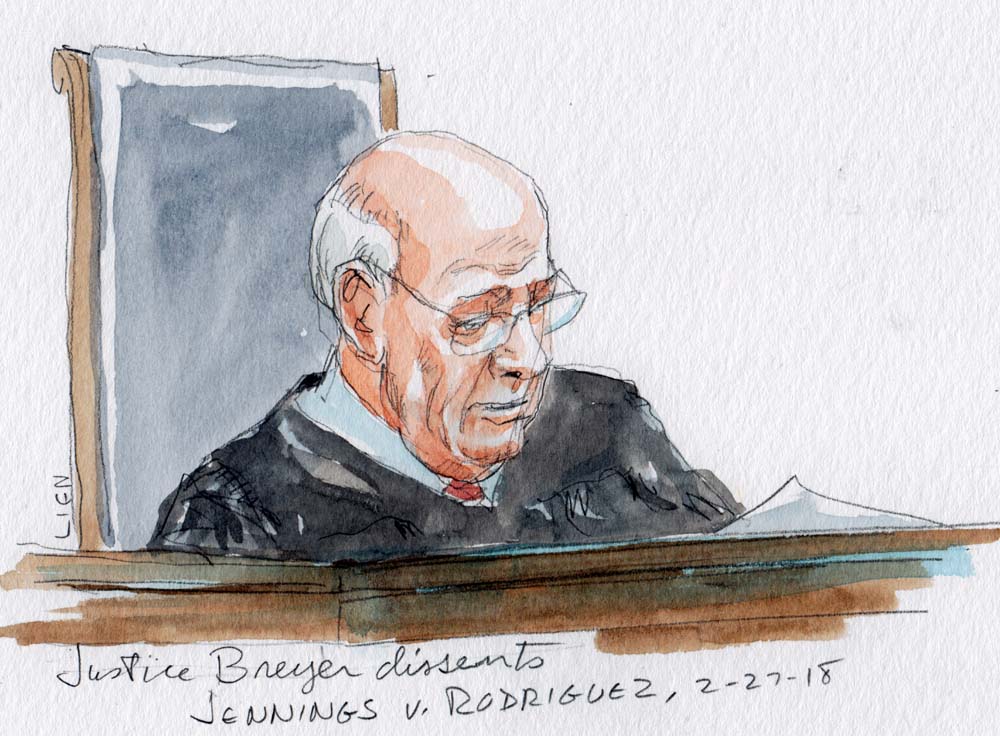Opinion analysis: Court tees up issue of the constitutionality of indefinite immigration detention for the 9th Circuit

on Feb 27, 2018 at 8:44 pm

Today the Supreme Court decided Jennings v. Rodriguez, a class-action challenge to provisions of the immigration laws allowing for immigrant detention. After hearing oral argument in the case last term, the court asked for further briefing on the constitutionality of the detention of immigrants. At the end of the term, still shorthanded after Justice Antonin Scalia’s death the previous year, the court ordered reargument. With President Donald Trump’s administration promising to increase the use of detention as a form of immigration enforcement, the case has great practical significance.

Justice Alito with opinion in Jennings v. Rodriguez (Art Lien)
As discussed in my preview of the argument, two Supreme Court cases decided at the dawn of the new millennium offer contrasting approaches to the review of decisions of the U.S. government to detain immigrants. In 2001, in Zadvydas v. Davis, the Supreme Court interpreted an immigration statute to require judicial review of a detention decision because “to permit[] indefinite detention of an alien would cause a serious constitutional problem.” Just two years later, the court in Demore v. Kim refused to disturb a provision of the immigration statute requiring detention of immigrants awaiting removal based on a crime. Relying on Zadvydas v. Davis, the U.S. Court of Appeals for the 9th Circuit affirmed a district court injunction that, in the words of the appeals court, avoided “a serious constitutional problem” by requiring bond hearings every six months for immigrant detainees.
I noted in my argument analysis that during the reargument, some justices worried that the 9th Circuit had acted more like a legislature than a court in fashioning an injunction requiring bond hearings every six months. Such concerns carried the day.
Justice Samuel Alito wrote for a 5-3 court. (Justice Elena Kagan recused herself, in all likelihood because she was involved in the case while serving as U.S. solicitor general.) Using a textual approach to interpreting the immigration statute, the majority found that nothing in the statute supports the imposition of periodic bond hearings as mandated by the court of appeals. The court held that, because the statute was clear, the 9th Circuit had misapplied the doctrine of constitutional avoidance. Alito emphasized that “a court relying on that canon … must interpret the statute, not rewrite it.”
In Part II of the opinion, not joined by Justices Clarence Thomas and Neil Gorsuch, a plurality of the court found that the statute (8 U.S.C. §§ 1252(b)(9), 1226(c)) did not preclude the court from exercising jurisdiction over the case. Although not engaging in “a comprehensive interpretation” of Section 1252, the plurality suggested that it only applied to individual removal orders. Because the detention is not a part of the U.S. government’s discretionary authority, Section 1226(e), which limits review of discretionary judgments, does not apply.
The court next reiterated the doctrine of constitutional avoidance as a tool of statutory construction. Ultimately, the court found that the 9th Circuit had misapplied the canon “because its interpretations of the three provisions at issue here are implausible.” As the court emphasized, “[s]potting a constitutional issue does not give a court the authority to rewrite a statute as it pleases.”
In Part IV, the court challenged Justice Stephen Breyer’s dissent for “ignoring the statutory language” and asserted that his interpretation of the statute was “implausible.”
In the last part of the opinion, the court remanded the case to the 9th Circuit, instructing it to address the constitutional challenges to the statute in the first instance. In so doing, it raised statutory jurisdictional questions that were not raised by the parties, questioned “whether a Rule 23(b)(2) class action continues to be the appropriate vehicle for respondents’ claims in light of Wal-Mart Stores, Inc. v. Dukes,” and directed the court of appeals to consider whether a class action is the appropriate tool for resolving due process clams that often are fact-specific.
Thomas, joined by Gorsuch, concurred in all but the jurisdictional part of Alito’s opinion. Thomas read the statute as preventing judicial review “except in a petition for review from a final removal order or in other circumstances not present here.” He went on to conclude that the bar on jurisdiction is constitutional.

Justice Breyer dissents in Jennings v. Rodriguez (Art Lien)
Breyer, joined by Justices Ruth Bader Ginsburg and Sonia Sotomayor, dissented, reading portions of his opinion from the bench. Breyer would have applied the doctrine of constitutional avoidance because “the majority’s interpretation of the statute would likely render the statute unconstitutional,” and he addressed the constitutional question in detail. In the course of a thorough review of the cases, Breyer observed that the Supreme Court “generally has not held that bail proceedings are unnecessary. Indeed, it almost always has suggested the contrary.” His conclusion: The decisions “tell us that an interpretation of the statute … would deny bail proceedings where detention is prolonged would likely mean that the statute violates the Constitution.” Breyer also read the statute as requiring “bail proceedings in instances of prolonged detention without doing violence to the statutory language or to the provisions’ basic purposes.” Finally, Breyer disputed the majority’s suggestions that the statute bars review and that the case was inappropriately brought as a class action.
In some respects, the court’s decision in Jennings v. Rodriguez takes us back to the drawing board. After sparring among themselves over two terms, the justices remanded the case to the 9th Circuit to decide a meaty constitutional question — whether indefinite detention of noncitizens without a bond hearing as authorized by the immigration statute is constitutional.


